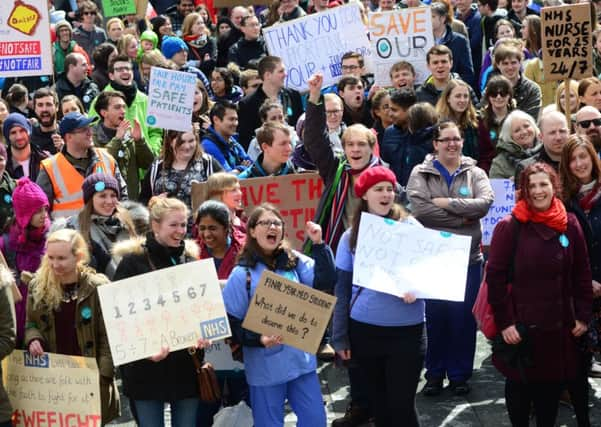Government thought medics 'would just roll over' in junior doctors dispute, BMA claim


The long-running, and at times bitter, row between junior doctors and the Government resulted in the first ever all-out strike in the history of the NHS in April.
The action, which forced NHS trusts across the region to postpone thousands of appointments and procedures, with more than 4,000 outpatient appointments in Leeds, Sheffield, York and Mid Yorkshire among those affected, followed four strikes earlier in the year where emergency cover was provided.
Advertisement
Hide AdAdvertisement
Hide AdA new deal was finally agreed in May, and thousands of junior doctors across England are currently voting on whether the accept the new contract, with results of the ballot due on July 6.
At the British Medical Association (BMA) annual conference in Belfast today, Dr Johann Malawana, chairman of the organisation’s junior doctors committee, said medic has “no choice” but to take action over the row - and that the Government picked a fight with junior doctors because it “thought the medical profession would just roll over”.
Dr Malawana said: “The question people will ask when they look back on this dispute is why on earth did this Government pick a fight with junior doctors?
“They said it was about seven-day services, but they could not tell us what it meant, or how it would be staffed and funded. They couldn’t fail to notice we worked seven days a week already.
Advertisement
Hide AdAdvertisement
Hide Ad“No, I think the Government picked a fight because they thought they could win. They thought the medical profession would just roll over. We didn’t, we shouldn’t, and I’m confident to say that in the future, we won’t.
“When we were faced with those completely unacceptable proposals that would have failed to protect us from unsafe hours, failed to stem the recruitment crisis, failed a generation of doctors raising their concerns, we had no choice but to take action.
“Industrial action was our last resort... At every picket line I saw junior doctors speak up with energy and eloquence in defence of patient care.”
Dr Malawana said that junior doctors’ leaders had visited 130 hospitals across the country to explain the new deal.
Advertisement
Hide AdAdvertisement
Hide AdHe said the contract had “significant improvements” on the original plan and was a “good deal”.
“It’s now time to vote, and I urge all eligible junior doctors and medical students to do so,” he said. “I know our members hold different views, but what I think is beyond argument is that we are only in a position to have anything to offer them because we stood up, together, for what we believe in.
“I think we have delivered a good deal despite unbelievable odds.”
If agreed by BMA members, all junior doctors will move on to the new terms between October and August next year.
Advertisement
Hide AdAdvertisement
Hide AdBMA members at the conference also voted in favour of a motion commending the Governments of Scotland, Wales and Northern Ireland for “not seeking to impose a new contract and for maintaining good working relationships with junior doctors”.
A spokesperson for the Department of Health said it did not wish to comment on Dr Malawana’s speech.